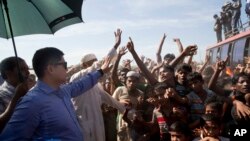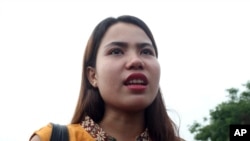Myanmar’s top court rejected Tuesday the final appeal of two Reuters journalists jailed while working on an investigation into the killing of 10 Rohingya Muslim men and boys.
The Supreme Court’s decision upheld seven-year prison sentences for Wa Lone and Kyaw Soe Oo. The court did not give a reason for its ruling, which was quickly condemned by rights groups.
The two reporters were arrested in December 2017 and sentenced last September. They were charged with illegally possessing official documents. The documents related to security operations taking place in the western state of Rakhine.
In August 2017, suspected Rohingya militants launched attacks against state security forces in Rakhine. In answer, government troops carried out attacks against the rebels and their supporters. About 700,000 Rohingya fled the area to escape the violence. Most are now living in refugee camps in neighboring Bangladesh.
The United Nations has described the Myanmar military operation as a well-organized example of ethnic cleansing. Myanmar officials have denied the military carried out human rights abuses. It said the campaign was necessary to defend against attacks by Rohingya militants.
The chief legal officer for Reuters, Gail Gove, reacted to the court’s rejection of the appeal. "Wa Lone and Kyaw Soe Oo did not commit any crime, nor was there any proof that they did," Gove said.
She added: "Instead, they were victims of a police set-up to silence their truthful reporting. We will continue to do all we can to free them as soon as possible."
Phil Robertson is the deputy Asia director for New York-based Human Rights Watch. He repeated the organization’s opposition to the legal actions against the two reporters, who in his words, were just “doing their jobs as investigative journalists.”
“Sadly, when it comes to media freedom, both Myanmar’s military and the civilian government seem equally determined to extinguish any ability to question their misrule and rights violations,” Robertson said.
The two were not present for Tuesday’s decision, but their wives were. Kyaw Soe Oo’s wife, Chit Su, broke down in tears when the ruling was read. “Both he and I hoped for the best,” she told reporters. “I am terribly sad for this decision.”
A lawyer for the two journalists in Myanmar said the pair could still seek their freedom by appealing directly to the president’s office or Myanmar’s legislature. The president could reduce the sentence, order a retrial or have the two men released. Legislative action would require a longer, more complex process.
Rights groups have urged Myanmar's civilian leader Aung San Suu Kyi to use her influence to intervene in the case. But so far, she has not done so.
The investigation the journalists were working on was completed by other Reuters employees and published in 2018. The coverage was recently awarded the Pulitzer Prize for international reporting.
I’m Bryan Lynn.
Bryan Lynn wrote this story for VOA Learning English, based on reports from the Associated Press, Reuters and Agence France-Presse. Hai Do was the editor.
We want to hear from you. Write to us in the Comments section, and visit our Facebook page.
_____________________________________________________________
Words in This Story
determined – adj. strong desire to do or complete something
extinguish – v. to stop something








